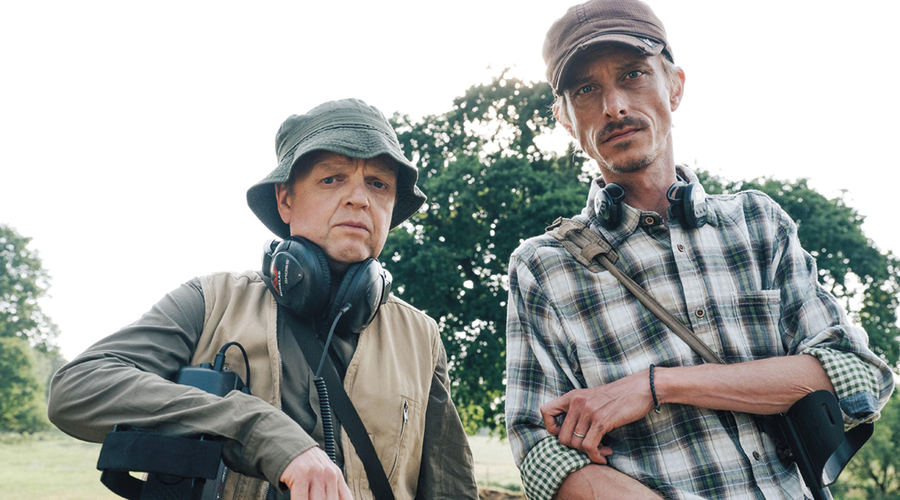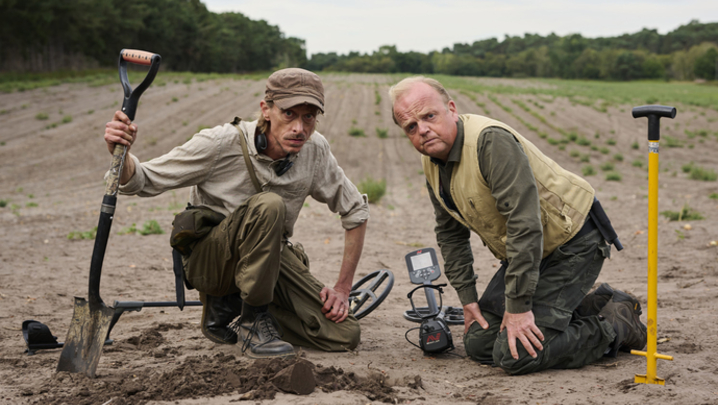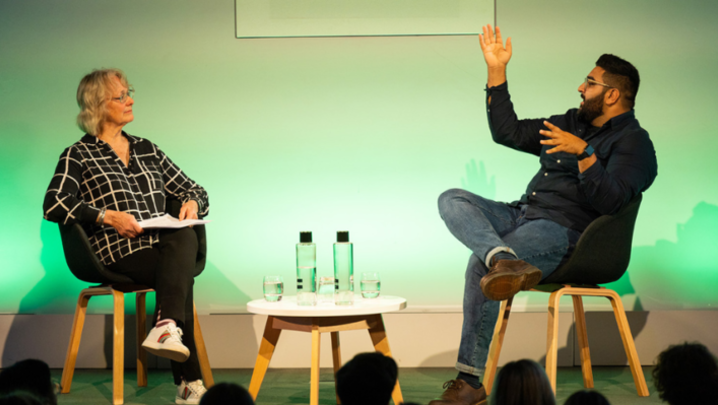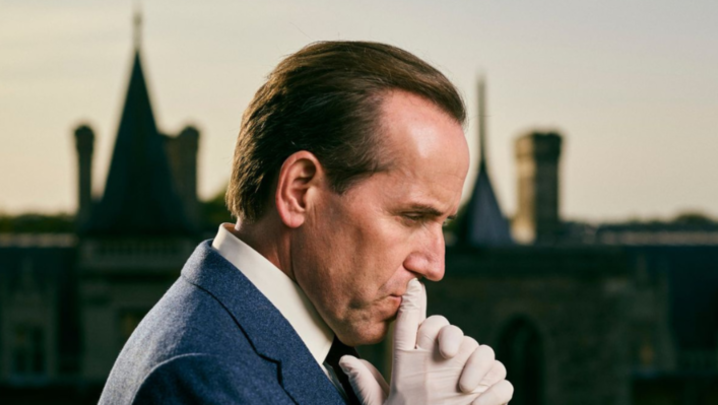Mark Lawson learns how one of TV’s brightest but unlikeliest stars turned reticence into an art form
For many actors, physique is destiny. If Brad Pitt and Danny DeVito had each other’s bodies, they would probably have each other’s careers.
Tall, thin, gaunt and with deep-set eyes, Mackenzie Crook was probably bound to be asked regularly to play men on the spectrum from ill-at-ease through weird to extremist.
The best-known of these malcontents are creepy army reservist Gareth Keenan in The Office and Ragetti in the Pirates of the Caribbean movie franchise.
When the actor’s name was mentioned for a part in the BBC One drama Ordinary Lies in 2015, writer Danny Brocklehurst was enthusiastic but worried that “you never know with an actor who’s done big films, and so on, whether he’d want to be part of a TV ensemble”. But he accepted the role of car salesman Pete “straight away”.
“I got the impression,” says the screenwriter, “that he simply hadn’t been offered that kind of role: playing a decent, ordinary guy. His look does lend itself to oddballs.”
"He’s a joy to direct because there is no ego in the way"
Andy, the part Mackenzie Crook has now played in three series of BBC Four’s Detectorists, is not without oddness: the show’s comedy comes from the fact that the majority of viewers do not spend most weekends and many evenings metal-detecting in fields, as do Andy and his friend Lance (played by Toby Jones).
With Andy, though, the actor is at least entirely in control of how weird the character will be: he also writes and directs the show, which is expected, in the 2018 TV awards season, to add to the Bafta for Situation Comedy that it has previously won.
Mackenzie Crook’s triple level of involvement in Detectorists is a surprise to many of his collaborators, given that his diffidence is mentioned by all those who have met him.
“He was very quiet and shy,” recalls Danny Brocklehurst. But this reserved personality had advantages: “Because Ordinary Lies is a multi-narrative show, a lot of the time we were just asking him to be a glorified extra, really, walking across in the back of other storylines. And you never know how actors are going to be about that. But Mackenzie was totally fine with it.”
The show’s director, Ian Rickson, who cast the actor in a 2007 production of Chekhov’s The Seagull at London’s Royal Court Theatre, remembers: “In our casting meeting, he probably said four sentences in an hour.”
Despite this, Mackenzie Crook was chosen to play Konstantin, a doomed would-be dramatist. The cast also included a young actress called Carey Mulligan, who, the director recalls, initially seemed to be in a reticence contest with Crook: “In rehearsals, Mackenzie and Carey would sometimes be so shy that they’d ask me to look away while they were acting.” They got over it. “Months later,” he remembers, “they were playing a 900-seat theatre on Broadway with incredible depth, range and confidence.”
In a starry cast led by Kristin Scott Thomas, Guardian critic Michael Billington singled out the “lean, hungry” presence of Konstantin – although the actor would probably have struggled to come across as gross and sated.
The director now admits that he had thought of Crook for the classic Russian role while watching a scene in The Office in which Gareth, self-declared hard man of the Wernham Hogg Paper Company, unexpectedly cries at the departure of his boss and hero, Ricky Gervais’s David Brent.
Rickson subsequently directed Crook on stage again, in 2009-10, in the Royal Court, West End and Broadway runs of Jez Butterworth’s Jerusalem. The role is another in his collection of eccentrics: Ginger, a would-be DJ who has wasted his life as one of the disciples of a drug-dealing bullshitter played by Mark Rylance.
“Mackenzie most reminds me of a heron,” says Rickson. “There’s a delicacy there, a sensitivity, but also real strength.”
As is often the case with actors, the name under which Mackenzie Crook has become known is not what appears on his passport.
He was born Paul Mackenzie Crook in 1971 in Kent, to parents who worked for British Airways and the NHS. In common with many performers, he started by impersonating teachers, and has said that various disliked masters were the basis for a series of characters he played in the 1998 Channel 4 sketchshow, Barking, which first brought him to attention.
Despite his low-key nature, he seems to be a natural performer. Danny Brocklehurst notes: “I watch all the rushes [unedited film] every day when I’m having something made. And what interested me, on Ordinary Lies, was that there was never really a bad take with Mackenzie. Everything he would try just seemed right and truthful. Which really isn’t always the case. Sometimes, you have to work very hard with actors.”
Certainly, the outward modesty and timidity do not seem to extend to a lack of creative ambition. Mackenzie Crook is also a painter (a skill he developed on childhood holidays in South Africa) and has written and illustrated children’s books. Such diversification seems to have given him confidence for the multi-skilling of Detectorists.
Danny Brocklehurst remembers that Crook was “really nervous” about the series, “especially the writing of it”. But, he was open to advice (perhaps another positive consequence of his self-effacing nature), talking to the screenwriter of Ordinary Lies “a lot about writing – how much you change, how much you keep the same as a series develops”.
What strikes Ian Rickson, though, about the directing of Detectorists is that its creator has not been too affected by example or precedent, but has dared to go his own way. Although not a “mockumentary” in the style of The Office, the treasure-hunters show has a different sense of real life being watched.
“It has a very subtle, meditative aesthetic,” says the director. “It has no laughter track, or standard visual set-ups and pay-offs. It just allows the characterisation and detail of its world to organically create drama. Bliss.”
The shyness of which everyone speaks sometimes seems to extend almost to a wish not to be noticed at all. When I was writing this piece, a number of colleagues or friends of the actor declined to speak (or initially agreed, but then withdrew) after discovering that the profile was “not authorised” by him.
By journalistic convention, it is not usual to seek the permission of the subject of a profile featuring third-party impressions, for the obvious reason that, if vetoes were allowed, politicians and celebrities could decide when they wanted to be discussed by the media.
Mackenzie Crook, though, seems to have little to fear from the testimony of others.
“Every company of actors I know who have worked with ‘Mac’ end up loving him,” says Ian Rickson, “because of his unadorned, authentic sensibility. He’s a joy to direct because there is no ego in the way; and, underneath that introverted exterior, run such deep currents. I hope I get to work with him on so many things.”







